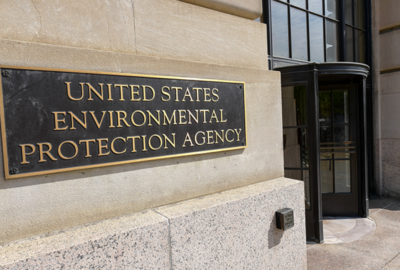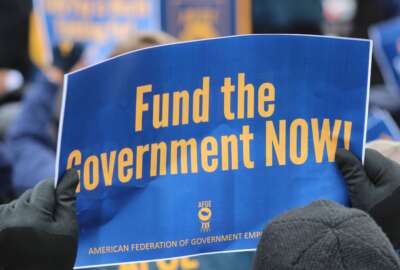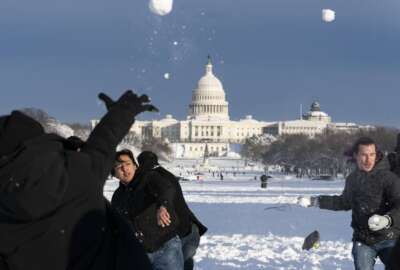Feds get details via video on how snow days are determined
Feds can now watch a video on a snow day, on how snow days are determined.
- Federal employees have some answers on how the government determines snow days. A new video details the steps of the process for deciding when federal facilities in D.C. will be closed. The decision is ultimately up to the Office of Personnel Management. But the new video explains that the agency partners with the National Weather Service to make the call. OPM also said changes in the government’s “operating status” are pretty rare. They usually happen for weather events like snow or occasionally hurricanes.(Federal operating status explained - Office of Personnel Management)
- In what's being called, "An Era of Great Power Competition," the Secretary of the Air Force announced sweeping changes. The Air Force and Space Force leaders are transforming their services' structures to prepare Airmen and Guardians for a potential conflict. The service will bring back warrant officers ranks in IT and cyber fields to provide leadership in these specialized fields. The service also plans to move Air Forces Cyber from under Air Combat Command and make it a standalone service component command. The move reflects the importance of the cyber mission to the Air Force. (Reoptimizing for Great Power Competition - U.S. Air Force)
- The largest federal employee union is calling on Congress to give federal employees a higher pay raise this year. American Federation of Government Employees (AFGE) is calling on lawmakers to support a 7.4% average pay raise for federal employees next year. That is what federal employees would receive under a recent bill introduced by Sen. Brian Schatz (D-Hawaii) and Rep. Gerry Connolly (D-Va.). Feds got a 5.2% average pay increase this year. AFGE National President Everett Kelley told members at a rally on Capitol Hill that higher pay is a top issue for the union. "We're here to tell Congress it's time. Matter of fact, is past time for federal employees to receive what they are due for hard work and service to the American people," Kelley said.(AFGE rallies for 7.4% federal employee pay raise, spending deal to avoid government shutdown - Federal News Network)
- A Defense Department contractor from Missouri pleaded guilty to obtaining parts for the military from overseas, undercutting domestic suppliers. David Murar is facing one felony count of conspiracy to commit wire fraud. From April to October 2022, Murar received nine federal contracts using fraudulent misrepresentations worth at least $333,000 for parts including nuts, bolts, washers, sleeves and tools. Murar is scheduled to be sentenced on May 7. The charge carries a penalty of up to 20 years in prison and a fine of up to $250,000.
(Defense contractor pleads guilty to fraud - GSA OIG)
- Rep. Jill Tokuda (D-Hawaii) is pressing defense officials to address complaints from residents about their drinking water. The Hawaii Department of Health has received over 50 reports about tap water quality from people using the Navy water system. The complaints resurfaced almost two years after the Navy finished its major effort to clean up 19,000 gallons of fuel that leaked into the drinking water supply at Joint Base Pearl Harbor-Hickam. Meredith Berger, assistant secretary of the Navy for installations, energy and environment, said the service has a team of scientists and communications experts to look into the problem and share information with residents.
- The CIO-SP3 contract is in need of yet another extension. The National Institutes of Health IT Acquisition and Assessment Center (NITAAC) is working through the process to add six more months to the current expiration date of April 29. NITAAC is planning to keep CIO-SP3 open through October 29 and have the option for another six months after that, if necessary. Brian Goodger, the NITAAC director, said the reason for the new extension is that the CIO-SP4 vehicle is facing six new protests before the Court of Federal Claims, which could take up to a year to be resolved.(NITAAC seeking another 6-month extension for CIO-SP3 - Federal News Network)
- How effective are student loan repayments for federal recruitment and retention? The Office of Personnel Management wants to hear more from agencies. Along with OPM’s standard data collection on how much agencies gave out in student loans last year, OPM is looking for optional feedback from agencies on best practices and lessons learned for the government’s student loan repayment program. Agencies have until March 31 to respond.(Request for 2023 data on student loan repayments - Office of Personnel Management)
- The Navy is implementing artificial intelligence to optimize personnel assignments. Capt. Kathleen Powell, the force data officer for the Navy Reserve, said her team is using data analytics to automate and streamline the process of personnel assignments. The AI system considers the specific requirements of different communities within the service. For instance, the system will optimize assignments based on unique skill sets or needs of different groups. The goal of the system is to allow the service to decrease the workload for its sailors.(Navy uses AI to optimize personnel assignments - Navy CIO)
- What credit should artificial intelligence get for creating new inventions? The U.S. Patent and Trademark Office (USPTO) is coming up with answers. The agency issued new guidance for inventorship in the AI age. It gives instructions to determine whether a human’s contributions to an innovation are significant enough to qualify for a patent. That is in cases when an AI algorithm contributed to the work. USTPO said it is not implementing any new requirement to disclose the use of AI, except in some rare circumstances. (AI and inventorship guidance - USPTO)
- Some military members may be eligible for more types of paid time off. The Office of Personnel Management is amending the rules for recent changes to family and medical leave, as well as paid parental leave. Under the 2024 National Defense Authorization Act, employees became eligible for the leave after a year of federal service. But initially, only civilian service was counting toward the requirement — and not military service. Now OPM said military service should be counted toward that total. Agencies should reach out to employees who have past military service to see if they qualify for the benefits.(Amendment related to inclusion of certain military active service for family and medical leave and paid parental leave - Office of Personnel Management)
- The long-term impacts of a hybrid federal workforce might just be a shrinking footprint of federal buildings and more satisfied federal employees, according to a new study. The National Capital Planning Commission and the Metropolitan Washington Council of Governments have found that a telework-friendly federal workforce will help agencies attract and retain employees. They also found it will help accelerate efforts to consolidate the footprint of federal office buildings, especially in the D.C. metro area. The study also said some impacts are unclear, such as whether less commuting by teleworkers reduces carbon emissions. (Regional workplace scenario planning study explores impact of telework - National Capital Planning Commission)
Copyright © 2025 Federal News Network. All rights reserved. This website is not intended for users located within the European Economic Area.
Peter Musurlian
Peter Musurlian is a producer at Federal News Network.
Follow @PMusurlianWFED






